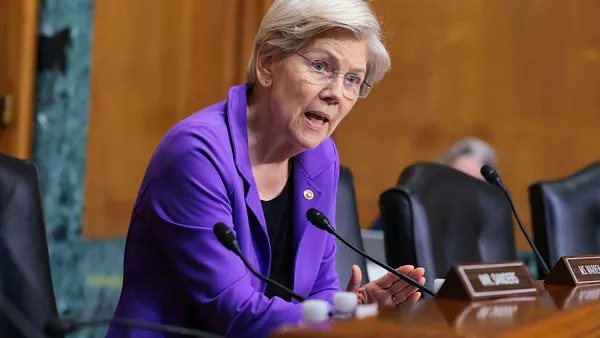Dive Brief:
- Morgan Stanley CEO James Gorman tested positive for COVID-19 after first experiencing symptoms in mid-March, but he has fully recovered. Gorman disclosed the news in a 10-minute video emailed to bank employees Thursday, according to Reuters.
- Gorman was ill, it turns out, when he wrote a companywide memo March 26, pledging Morgan Stanley would not lay off any employees in 2020. That declaration spurred several other banks, including Bank of America, Citi and Wells Fargo, to make similar promises regarding staffing.
- The bank's choice to hold Gorman's diagnosis close to the vest raises questions as to when and how companies should disclose information about an executive's health.
Dive Insight:
After testing positive, Gorman, 61, self-isolated at home and continued leading regular calls with the company’s operating committee and board of directors, never experiencing severe symptoms, he said, according to Reuters.
The Securities and Exchange Commission (SEC) requires that public companies disclose material facts to the public. However, a Morgan Stanley spokesman said Gorman’s condition didn't fit the criteria for disclosure.
"Given the fact that Mr. Gorman’s symptoms were not severe and that he continued to function as Chairman and CEO while working from home throughout the illness (as are more than 90% of our employees), it was determined that his illness was not material" enough to disclose to shareholders in a filing, spokesman Wesley McDade told CNBC in an email.
JPMorgan Chase, by comparison, disclosed within hours CEO Jamie Dimon had emergency heart surgery in March and that the bank would be led during his recovery by senior executives Daniel Pinto and Gordon Smith.
Jefferies Financial Group disclosed in late March that its chief financial officer, Peg Broadbent, died of complications related to the coronavirus. Outside the banking sphere, NBCUniversal CEO Jeff Shell and Booking Holdings CEO Glenn Fogel received coronavirus diagnoses and disclosed them shortly afterward.
A chief executive's positive diagnosis during a global pandemic may affect investors’ confidence, but disclosure to regulators may not always be necessary, Michael Hermsen, a Mayer Brown attorney who previously worked in the SEC’s Division of Corporation Finance, told Reuters.
"There is no specific requirement to disclose when an executive becomes sick, unless the information is material ... such as if the executive is unable to continue to perform even if only temporarily," he said.
Gorman’s diagnosis may have played a hand in his preemptive openness regarding staffing levels at Morgan Stanley in the wake of the outbreak.
"While long term we can't be sure how this will play out, we want to commit to you that there will not be a reduction in force at Morgan Stanley in 2020. Aside from a performance issue or a breach of the Code of Conduct, your jobs are secure," Gorman wrote March 26. "At the end of this year, we will know what we are dealing with, and hopefully the economy will be on the mend by then."
Gorman has served as Morgan Stanley’s top executive since 2010. When the bank last year announced a staff-wide reduction in bonuses, Gorman took a 7% pay cut — despite the bank reporting a 46% increase in profit over 2018.














